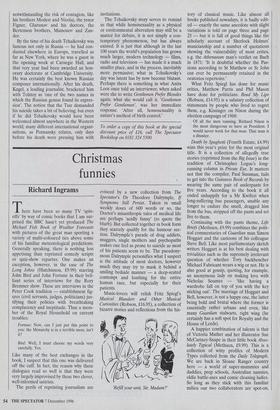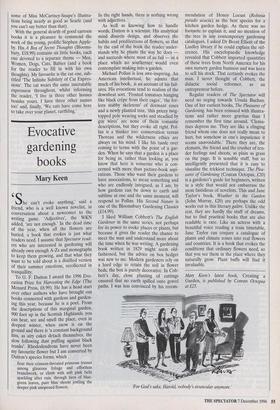Christmas funnies
Richard Ingrams
There have been so many TV 'spin- offs' by way of comic books that I am sur- prised the BBC hasn't yet produced The Michael Fish Book of Weather Forecasts with pictures of the great man sporting a variety of multi-coloured ties above some of his familiar meteorological predictions. Generally speaking, there is nothing less appetising than reprinted comedy scripts or quiz-show repartee. One makes an exception, however, in the case of The Long Johns (Hutchinson, £9.99) starring John Bird and John Fortune in their bril- liant series of interviews for the Rory Bremner show. These are interviews in the Peter Cook tradition — establishment fig- ures (civil servants, judges, politicians) jus- tifying their policies with breathtaking complacency and ineptitude. Thus a mem- ber of the Royal Household on current troubles: Fortune: Now, can I just put this point to you: the Monarchy is in a terrible mess, isn't it?
Bird: Well, I must choose my words very carefully. Yes.
Like many of the best exchanges in the book, I suspect that this one was delivered off the cuff. In fact, the reason why these dialogues read so well is that they were very largely improvised by these two clever, well-informed satirists.
The perils of reprinting journalism are evinced by a new collection from The Spectator's Dr Theodore Dalrymple, If Symptoms Still Persist. Taken in small weekly doses of 600 words or so, the Doctor's misanthropic tales of medical life are perhaps 'acidly funny' (to quote the blurb). But collected together in book form they scarcely qualify for the humour sec- tion. Dalrymple's parade of drug addicts, muggers, single mothers and psychopaths makes one feel as prone to suicide as most of his patients seem to be. The pseudony- mous Dalrymple personifies what I suspect is the attitude of most doctors, however much they may try to mask it behind a smiling bedside manner — a deep-seated contempt and loathing for the entire human race, but especially for their patients.
Music-lovers will relish Fritz Spiegl's Musical Blunders and Other Musical Curiosities (Robson, £16.95), a collection of bizarre stories and reflections from the his- 'Refill your unit, Sir, Madam?' tory of classical music. Like almost all books published nowadays, it is badly edit- ed — exactly the same anecdote with slight variations is told on page three and page 25 — but it is full of good things like the scholarly account of Sherlock Holmes' musicianship and a number of quotations showing the vulnerability of most critics, e.g. the Athenaeum man's verdict on Bach in 1871: 'It is doubtful whether the Pas- sions according to St Matthew or St John can ever be permanently retained in the oratorios repertoire.'
What Fritz Spiegl has done for music critics, Matthew Parris and Phil Mason have done for politicians. Read My Lips (Robson, £14.95) is a salutary collection of statements by people who lived to regret them, e.g. Kissinger on Nixon during the election campaign of 1968:
Of all the men running, Richard Nixon is the most dangerous to have as President. I would never work for that man. That man is a disaster.
Death by Spaghetti (Fourth Estate, 14.99) wins this year's prize for the most original title. It is a collection of allegedly true stories (reprinted from the Big Issue) in the tradition of Christopher Logue's long- running column in Private Eye. It matters not that the compiler, Paul Sussman, fails to get into the Guinness Book of Records by wearing the same pair of underpants for five years. According to the book it all ended unhappily for a Mr Kwifezi when long-suffering bus passengers, unable any longer to endure the smell, dragged him from the bus, stripped off the pants and set fire to them.
Continuing with the pants theme, Life Briefs (Methuen, £9.99) combines the polit- ical commentaries of Guardian man Simon Hoggart and the cartoons of his colleague Steve Bell. Like most parliamentary sketch writers Hoggart is at his best dealing with trivialities such as the supremely irrelevant question of whether Tory backbencher Michael Fabricant wears a wig or not. He is also good at gossip, quoting, for example, an anonymous lady on making love with Nicholas Soames — 'like having a wardrobe fall on top of you with the key sticking out'. The marriage of Hoggart and Bell, however, is not a happy one, the latter being bold and brutal where the former is essentially rather urbane and even, like many Guardian stalwarts, right wing (he certainly has a soft spot for Royalty and the House of Lords).
A happier combination of talents is that of Victoria Mather and her illustrator Sue McCartney-Snape in their little book Abso- lutely Typical (Methuen, £9.99). This is a collection of witty profiles of Modern Types collected from the Daily Telegraph. We are back in Sloane Ranger country here — a world of super-mummies and daddies, prep schools, Australian nannies, oldie battle-axes and comic cleaning ladies. So long as they stick with this familiar milieu our two collaborators are spot-on, some of Miss McCartney-Snape's illustra- tions being nearly as good as Searle (and you can't say better than that).
With the general dearth of good cartoon books it is a pleasure to commend the work of the young, prolific Stephen Apple- by. His A Box of Secret Thoughts (Blooms- bury, £18.99) contains six little books, each one devoted to a separate theme — Men, Women, Dogs, Cats, Babies (and a book for the reader to fill in with his own thoughts). My favourite is the cat one, sub- titled 'The Infinite Subtlety of Cat Expres- sions'. The cat wears the same inscrutable expression throughout, whilst informing the reader, 'I live in three other houses besides yours. I have three other names too' and, finally, 'We cats have come here to take over your planet, earthling.'



















































































 Previous page
Previous page